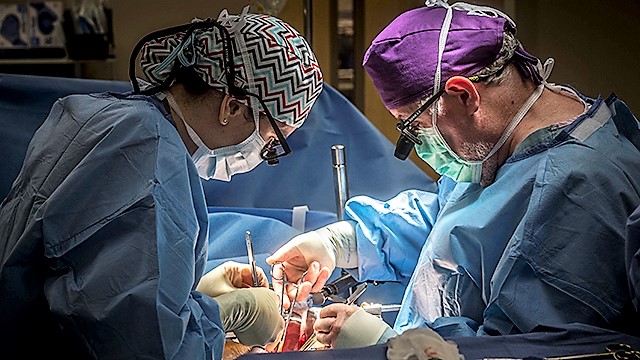By Tyler Greer
Alabama NewsCenter

The general surgery residents in the University of Alabama at Birmingham Department of Surgery who have trained with transplant surgeon Mark Deierhoi, M.D., director of UAB’s Renal Transplant Program, marvel at many things about one of their most influential surgical teachers.
They laud his attention to detail, his diligent instruction, his enthusiasm for resident education – even his knowledge of music and movies, which residents say is quite impressive. But the one word they often use to describe Deierhoi? Patient.
“Dr. Deierhoi is the most patient teacher in the operating room,” said Margaux Mustian, M.D., a UAB School of Medicine resident and postdoctoral scholar from High Point, North Carolina. “He gives great attention to detail and constructive feedback in the operating room, all while remaining very calm and approachable. Without a doubt, he has been one of the key mentors who inspired me to pursue transplantation as a career.”
“During our five years of training, Dr. Deierhoi is the gatekeeper for making the transition from a junior resident to a senior resident,” said Laura Allen Hickman, M.D., a resident physician from Knoxville, Tennessee. “His OR is our first real exposure to the precision and attention to detail required for vascular anastomoses, and he has patiently guided 31 years worth of general surgery residents through the process. With the ever-increasing demands for surgeons’ time, his commitment to teaching residents – and especially his patience for their inexperience – has not changed.”
General surgery residents – a group that includes Mustian and Hickman – recently honored Deierhoi with the Kirby I. Bland Surgical Faculty Teacher of the Year award. It is part of a set of faculty awards given annually at the General Surgery Residency Graduation Chief Dinner.
Deierhoi, who has performed more than 2,200 kidney transplant surgeries in his career, trains general surgery residents early in their careers. The fact that they would honor him when he is several years’ removed from teaching most of them came as quite a surprise, he says.
“That the residents wanted to honor me, honor someone who worked with them when they were just starting out: I really appreciate that a lot,” Deierhoi said. “I appreciate the fact that they thought of me after all of this time removed from their rotation. It’s an honor that the residents think well of my efforts to train them. It’s something I thoroughly enjoy doing.”
Deierhoi said he draws from his own experience as a trainee learning the surgical ropes when it comes to how he trains residents. His training as a resident, he said, was not ideal.
“My residency was not the greatest residency for teaching surgical technique,” Deierhoi said. “There wasn’t a lot of real close mentorship, and I didn’t really appreciate what a good teacher could do until my fellowship. The people who taught me in my fellowship were masters, and I learned an enormous amount from them.
“I’ve always felt that, if I could help the residents do better, teach them the right way, teach them technique and thought processes of all of the various parts of surgery, that it would be useful – and hopefully helpful – to them.”
Mustian and Hickman say the impact Deierhoi has had on their surgical education has been tremendous. Both of them chose to pursue transplant surgery in large part, they say, because they crossed paths with him.
“Dr. Deierhoi serves as a great educator throughout the renal transplant rotation and sets the perfect example of the surgeon I will strive to emulate when I am done with training,” Mustian said. “I can only hope to one day have a fraction of his talent and technical skills in the OR, compassion for patients and enthusiasm for resident training.”
Hickman said seeing how everyone who interacts with Deierhoi responds to him is very telling of both the type of person he is and the type of surgeon he is.
“Dr. Deierhoi has given thousands of patients the opportunity to get their lives back,” she said. “For many, a kidney transplant means freedom from dialysis, and thus the ability to work, travel and spend time with family that had previously been sacrificed. It is not uncommon to be walking around the hospital with Dr. Deierhoi and a patient will approach him and thank him for operating on them 10 years ago. He is one of those people who touches the lives of everyone he meets, and the appreciation from his patients, staff and residents is evident. Personally, he has served as a role model and reminder that one person can make a positive difference for countless individuals and communities.”
Deierhoi is one of four UAB transplant surgeons to perform transplants as part of the UAB Kidney Chain, the longest kidney transplant chain in the world. To date, 74 kidney recipients — 148 total surgeries including donor surgeries — have been transplanted as part of the chain, which is scheduled to pick back up again this month.
If you are interested in becoming a living-kidney donor, visit uabmedicine.org/kidneytransplant. To indicate your interest in donating your organs after death, visit www.organdonor.gov and sign up today.




